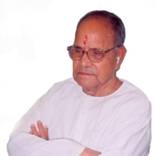This website is devoted to life and work of late Dr. Fatah Singh. The matter included in this site is divided into three parts. First part contains mainly one of the many thesis works done under his guidance, namely the thesis on Symbolism of Waters in Veda (by Dr. Sukarm Pal Singh Tomar). The second part contains the proceedings of one -day seminar on his published work in the form of various books. The third part contains his contributions on decipherment of Indus valley script.

 Dr.
Fatah Singh (13.7.1913 to 6.2.2008 AD) was a scholar of the century, when it
comes to interpretation of Vedas and related scriptures in spiritual light. He
would be best remembered for his unique, scientifically coherent, and practical interpretation of
Vedic literature, that is useful to every day life, as supported by the
manuscripts he has left behind and a number of doctoral thesis’s he guided.
Dr.
Fatah Singh (13.7.1913 to 6.2.2008 AD) was a scholar of the century, when it
comes to interpretation of Vedas and related scriptures in spiritual light. He
would be best remembered for his unique, scientifically coherent, and practical interpretation of
Vedic literature, that is useful to every day life, as supported by the
manuscripts he has left behind and a number of doctoral thesis’s he guided.
Dr. Singh was also a known expert on
An eminent scholar of
Veda, Hindi & Sanskrit literature, and linguistics, Dr. Singh was
honored by several prestigious national awards which included the Harjimal
Dalmia Puraskar(1948), for Vedic Darshan, U. P. Government prize for
Kamayani Saundarya (1953), Rajasthan Government
Special Merit Pay for original research (1963-72), Honorary
Mahamahopadhyaya title (1982), Maharana Kumbha award of Mewar Foundation
(1988), Delhi Sanskrit Academy Samman (1990), Rajasthan Sanskrit Academy
Samman (1992), Sahitya Bhushan Samman by U.P. Hindi Sansthan (1998). Ved
Vedaang Samman by Sandipani Asharam (2000), and Sahitya Shiromani Samman by
Savitri Sansthan
Dr.
Fatah Singh’s beginning was very humble, with strong core values that
remained a solid foundation throughout his immensely challenging life. He was
born in a farmer’s family at Bhadeng Kanja, a village in Pilibhit district
of U.P. that had no schools or educated people. In spite of practically no support for education,
with inspiration from Dayanand Saraswati, he went all the way to obtain the
first “D. Lit.” degree from the famous
For several years Dr. Singh served as Head of Hindi
& Sanskrit Departments and, later as Principal, in various colleges of
1.Veda
Vidyaa ka Punaruddhaar ( Resurrection of Vedic Knowledge) (Veda
Sansthan, C-23, Rajouri Garden, New Delhi - 110027) Price Rs.200/- 2.Maanavataa
ko Vedon ki Den(The gift of Vedas to Humanity) (Veda
Sansthan, C-23, Rajouri Garden, New Delhi – 110027) out of print. 3.Bhaavi
Veda Bhaashya ke Sandarbha Sutra(The Reference Points of Future Explanation of
Vedas) (Veda
Sansthan, C-23, Rajouri Garden, New Delhi – 110027) Price Rs.15/- 4.Dhaai
Akshar Veda ke( Two and a Half letters of Veda) (Veda
Sansthan, Rajouri Garden, New Delhi – 110027)Price Rs.50/- 5.Vedic
Darshan(Published in year 1947, now under reprint) 6.Vedic
Etymology(Published in year 1955, under reprint) 7.Kaamaayani
Soundarya( Under reprint) 8.Sindhu
Ghati ki Lipi me Brahmanon aur Upnishdon ke Pratik(Symbolism of Brahmanas and
Upnishads in Sindhu Valley Script)(Rajasthan Oriental Research Institute,
Jodhpur, India, 1969AD.)
Some of
the above books are available in image form on
Google Documents
Part I
Part II
Proceedings of one - day seminar on life and work of Dr. Fatah Singh
Part III
For any comment, please mail to :